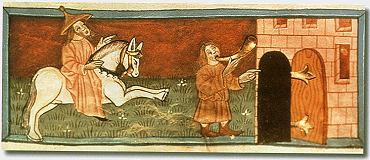|
We read in the Torah that our ancestors went to Egypt in Joseph's time. At first, they lived there peacefully, but later a new king, or pharaoh, enslaved them and forced them to do backbreaking work with mortar and heavy bricks.
Pharaoh replied, "I do not know Adonai, and I will not let the Hebrews go." So God sent plagues down on the Egyptians. First the river turned to blood. But Pharaoh's heart remained stubborn. Then came thousands of frogs; swarms of insects; flies; the death of cattle; sores on the skin; hail; locusts; absolute darkness for three days; and finally, a tenth plague, the death of every firstborn. This time, Pharaoh said to Moses, "Go, you and all the Hebrews; leave Egypt now!" The Israelies hurried out of the land. There was no time for the dough they had prepared to rise. They took it with them, carrying it on their backs into the wilderness. When they baked their dough it came out matzah, flat loaves of bread. Moses said to the people, "We must remember this day, when God brought us out of Egypt. Each year at this time we will have a feast to honor God, and we will not eat leavened bread for seven days." The Israelites traveled through the wilderness until they reached the Sea of Reeds. But meanwhile Pharaoh began to regret that he had released them. He sent his mightly army to capture them. As they stood at the Sea of Reeds, the Israelites turned and saw the Egyptian chariots thundering toward them. They were trapped!
Then God sent a strong wind to divide the water. The
Israelites crossed the sea on dry ground, between
two walls of water, as the Egyptian army raced after
them. But as soon as the Israelites were safely
across, the water rushed back, flooding over the
chariots and their riders. The entire Egyptian army
was drowned. Finally, the Israelites were free.
|
THE TIME OF TELLING
Passover, or Pesah in Hebrew, is the second
of the three pilgrimage festivals, the shalosh
regalim. (Do you remember what the first one is?)
When Moses explained the Passover festival to the
Israelites, he said, "And you shall tell your
children on that day, 'It is because of what Adonai did
for me when I came out of Egypt.'"
Telling is really the most important part of the
seder, and Haggadah, the Hebrew word for
"Telling," is the name of the book we use to
guide us through the seder. The Haggadah tells the
history of our ancestors' Exodus from Egypt and includes
stories, prayers, poems, and songs. It has been changed
and added to bit by bit over the centuries.
In Israel, Passover is observed for seven days. Outside
Israel, some Jews celebrate Pesah for seven days and
others for eight days. However, it is the tradition for
all Jews to have a special feast at the beginning
of the holiday. Because everything is done in a certain
sequence, the feast is called a seder, which means
"order" in Hebrew.
This is a page from a German Haggadah made almost 600
years ago. It shows a scene of the Messiah coming to
Jerusalem. Our tradition teaches that when the Messiah
comes the entire world will be filled with peace.

![[Moses petitioning Pharaoh]](page117.jpg) God heard the Israelites' cries and sent Moses to lead
them out of Egypt. Moses went to Pharaoh and said,
"Adonai, the God of Israel, says, 'Let My people
go.'"
God heard the Israelites' cries and sent Moses to lead
them out of Egypt. Moses went to Pharaoh and said,
"Adonai, the God of Israel, says, 'Let My people
go.'"